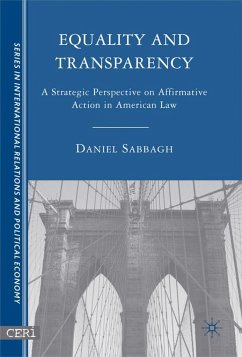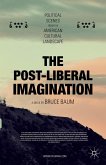Can affirmative action policies be convincingly justified? And how have they been legitimized over time? In a pluridisciplinary perspective at the intersection of political theory and the sociology of law, Daniel Sabbagh criticizes the two prevailing justifications put forward in favor of affirmative action: the corrective justice argument and the diversity argument.He defends the policy instead as an instrument designed to bring about the deracialization of American society. In this respect, however, affirmative action requires a measure of dissimulation in order to succeed.Equality and Transparency explains why this is so and provides a new interpretation of the strategic component in the Supreme Court's case law while identifying some of its most remarkable side effects.
'Equality and Transparency is an erudite and analytically innovative study of affirmative action. It is particularly original and incisive in its treatment of the problematic aspects of the "diversity" rationale. I do not know of a more balanced and comprehensive treatment of the subject."
- George M. Fredrickson, Edgar E. Robinson Professor of United States History Emeritus, Stanford University"From the time America's Constitution-makers protected slavery without daring to use the word, the nation's leaders have often engaged in euphemism and misdirection when trying tomaintain andtrying to transformthe nation's pervasive patterns of racial inequality. Daniel Sabbagh's incisive study shows how today's Supreme Court continues that pattern, not daring either to endracial affirmative action or toembrace openly allthe reasons why it is still needed. A superb book." - Rogers M. Smith, Christopher H. Browne Distinguished Professor of Political Science, University of Pennsylvania
- George M. Fredrickson, Edgar E. Robinson Professor of United States History Emeritus, Stanford University"From the time America's Constitution-makers protected slavery without daring to use the word, the nation's leaders have often engaged in euphemism and misdirection when trying tomaintain andtrying to transformthe nation's pervasive patterns of racial inequality. Daniel Sabbagh's incisive study shows how today's Supreme Court continues that pattern, not daring either to endracial affirmative action or toembrace openly allthe reasons why it is still needed. A superb book." - Rogers M. Smith, Christopher H. Browne Distinguished Professor of Political Science, University of Pennsylvania









